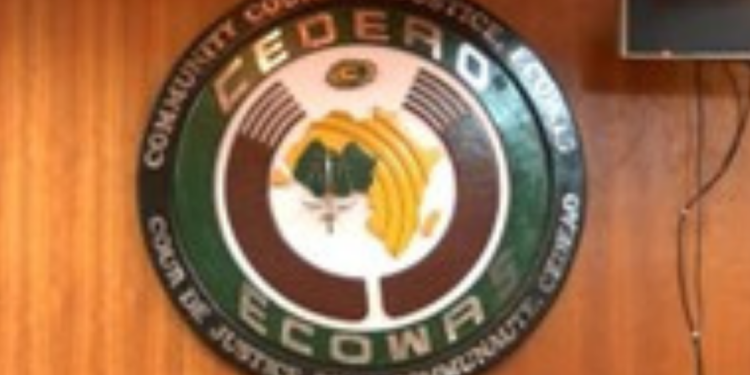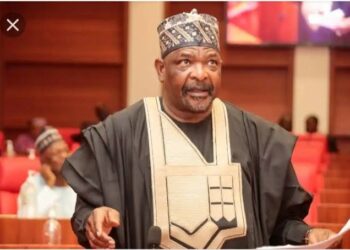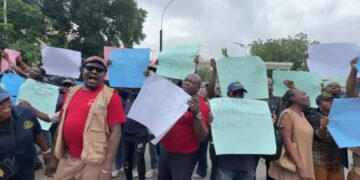The ECOWAS Court has dismissed a lawsuit brought by the Socio-Economic Rights and Accountability Project (SERAP) concerning the deadly Abuja-Kaduna train attack on March 28, 2022. The case, which aimed to hold the Nigerian government accountable for alleged human rights violations linked to the attack, was rejected on the grounds of jurisdictional and procedural deficiencies.
On the day of the incident, armed assailants bombed a passenger train carrying over 970 people on the Abuja-Kaduna rail line near Rigasa, Kaduna State. The attack resulted in numerous fatalities, injuries, and abductions, sparking national outrage and calls for greater security measures on critical transportation routes.
In response, SERAP filed a suit at the ECOWAS Court, arguing that the Nigerian government failed in its duty to protect the lives and safety of its citizens. The organization alleged that the lack of adequate security measures by the state violated the passengers’ fundamental rights to life, security, and dignity.
SERAP sought a court ruling that would mandate the Nigerian government to pay N50 million in compensation to each of the affected passengers and their families. The suit was grounded in the argument that the government’s negligence contributed to the severity of the attack and that the victims deserved redress for their suffering and losses. SERAP also aimed to highlight the broader issue of terrorism and insecurity affecting the region, citing similar attacks on educational institutions and public transportation as part of a pattern of state failure to protect citizens.
However, the ECOWAS Court, in its judgement delivered by Justice Dupe Atoki, ruled that it lacked jurisdiction to hear the case as it was presented. The three-member panel, including presiding judge Justice Ricardo Cláudio Monteiro Gonçalves and panel member Justice Sengu Mohamed Koroma, found the claim inadmissible under the ECOWAS Supplementary Protocol’s legal framework. Specifically, the court referenced Article 10(d) of the protocol, which requires that a party bringing a case for human rights violations must meet certain victim status requirements.

The court acknowledged that while it has the authority to adjudicate potential human rights violations within member states under Article 9(4) of the ECOWAS Supplementary Protocol, SERAP’s case did not meet the criteria necessary for consideration as a public interest litigation.
The ECOWAS Court emphasized that public interest cases, or actio popularis, should typically address violations affecting a broad, indeterminate segment of the public or the general populace itself. In contrast, the victims of the train attack were specific, identifiable individuals, which did not satisfy the requirements for a public interest lawsuit.
The court elaborated on its decision, noting that SERAP’s demand for financial compensation was directed towards specific victims of the attack rather than the general public. This focus on identifiable individuals contradicted the nature of public interest litigation, which traditionally seeks broader societal impact rather than specific individual remedies.
The reliefs sought by SERAP, including the N50 million compensation per passenger, were thus deemed inappropriate for consideration under the procedural rules governing public interest actions.
The dismissal of the case has sparked discussions about the limitations of legal recourse available to civil society organizations like SERAP when challenging state actions or inactions related to security and human rights issues. It also underscores the stringent requirements for public interest litigation at the ECOWAS Court, particularly in cases involving identifiable victims rather than widespread, diffuse harm.
Despite the dismissal, the ruling does not negate the legitimacy of SERAP’s concerns about government accountability and the broader issue of insecurity in Nigeria. The Abuja-Kaduna train attack remains a significant event that has prompted calls for increased investment in security infrastructure and better protection of critical public services.
The Nigerian government’s response to such incidents and its overall approach to combating terrorism and banditry continue to be subjects of intense public scrutiny and debate.
The ruling also highlighted the importance of meeting procedural requirements when filing cases in regional courts like the ECOWAS Court. While the court is empowered to address human rights violations within its member states, claimants must fulfil specific legal and procedural criteria to establish standing and the admissibility of their claims.
The decision underscores the need for civil society organisations to carefully navigate these legal frameworks when seeking redress for human rights violations on behalf of affected individuals or communities.
The ECOWAS Court’s decision to reject SERAP’s suit on jurisdictional grounds is a reminder of the complexities involved in pursuing legal action against state actors, particularly in regional judicial bodies. It also raises questions about alternative avenues for seeking justice and compensation for victims of violence and insecurity in Nigeria, especially in cases where the state is perceived to have failed in its protective duties.
Justice Maryanne Anenih concluded the hearing by setting a new date for the continuation of the trial, marking December 4 as the next court session, following the vacating of the initially scheduled date.




































